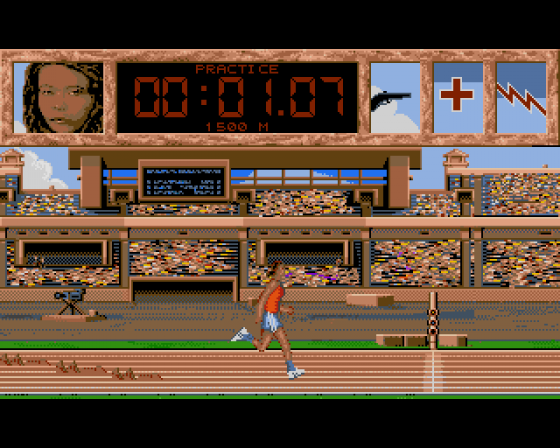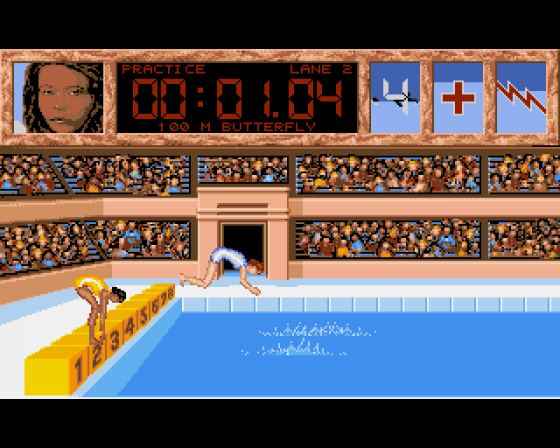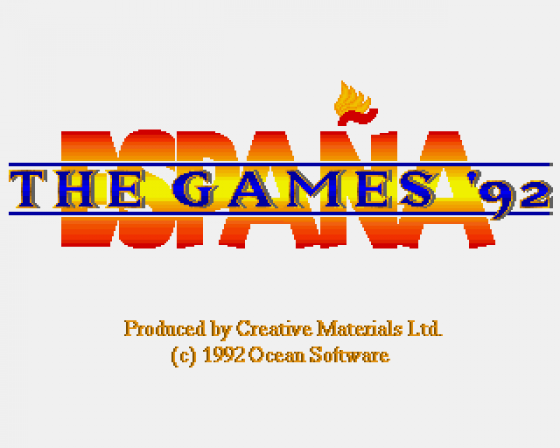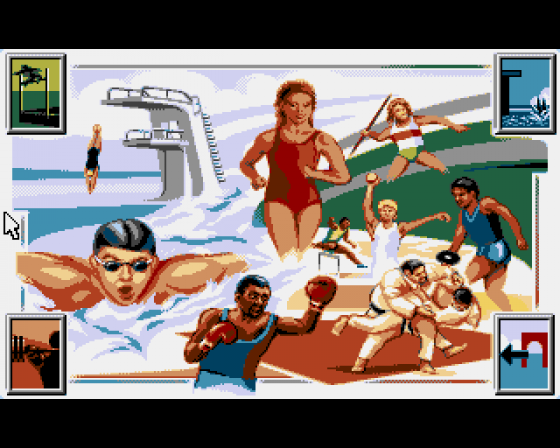
Amiga Power
 1st September 1992
1st September 1992
Categories: Review: Software
Author: Matthew Squires
Publisher: Ocean
Machine: Amiga 500
Published in Amiga Power #17
We want more than joystick waggling in our sports sims these days. Games '92 tries to supply the extra but hasn't got it right.
The Games '92
The Olympics is upon us again (well, it'll be long gone by the time you read this, but bear with me). For those of us not caught up in the mass-media coverage of disappointment and glory, there's no getting away from the commercial abduction of what used to be a purely amateur get-together. These are the '90s, when sports heroes also make a buck, selling milk or endorsing Amiga games. But that's enough about Carl Lewis Challenge - we're here to talk about Espana Games '92.
My first thoughts questioned how a game could successfully capture all the Olympic elements - 'over 30 events, team management, a hall of fame and extra contests', as the game claims. Even the Carl Lewis game covers only five events. "Perhaps I better sit down and study the manual for a day or two," I thought. It was just as well I did.
The structure of this game is divided and sub-divided into ten different sections. A category selection screen gives you a choice of track and field; swimming and diving; or boxing; wrestling, judo and fencing. Once you've selected which events you wish to take part in, a disk prompt tells you which of the four disks to insert. A further selection screen is divided into an action section, a reference section, and the management section.

The Games '92 sets out to be a strategy-cum-action arcade game - it's impossible to compete in any of the Olympic competitions unless you've been into the management section. This is because all events take place on specific dates, exactly the same as the real life Olympic games in Barcelona. Unless you advance the date (manually, using an on-screen calendar), all you can do is practice.
The practice level gives you no idea of the Olympic competition - in the 100 metres for example, all you do is run by yourself against the clock. (At least the separate arcade level in The Carl Lewis Challenge puts you into Olympic competition with other named athletes.)
Clicking on the management section eventually brings up the office screen. Among many other things you'll find the diary, a clock, the calendar, and the team file. Open this to bring your fictitious team on screen, then click on any athlete to peruse their athletic statistics.

Now select an athlete for each event. You must train and exercise them. By clicking on the diary you'll find out the dates and times of all activities leading up to and including the Olympics, with a training timetable already laid out for you.
Once exercise is complete, and you're happy with the training output of your athlete, you may advance the calendar and take your athlete to the first heats. It's important to remember that only when you've trained an athlete and consulted the diary for dates and times of heats, can you enter for Olympic competition. By comparison to the more fluid Carl Lewis, this aspect makes the game both frustrating and long-winded.
To begin competition, select the action section. If you've selected the right athlete and coordinated the right date and time, you can being entering heats. Make the wrong selection and all you can do is practice. Frustratingly, that means working back through all those sections to the office. It's completely inflexible.

Perhaps the most important aspect of this game is its control system. Timing is the key. In track and field events for instance, you must co-ordinate the button clicks with appropriate footfalls. You'll find that this applies in some form to all the events, but once you're in the boxing, fencing and judo it really does get complex.
You'd think that a game with so much complexity had got the basics right first. Wrong! The graphics in Games '92 are mediocre to say the least - they look like something from yesteryear. Even Track And Field, the 1984 coin-op that started the whole thing off, blows this to pieces visually.
The backgrounds are atrocious too - there's no animation in the crowd at all, for a start. Carl Lewis, by comparison, features animated faces and parallax scrolling, as well as some different angles on the competition action.
The so-called 'fun click-ons' in the office are utterly irrelevant. Yes, you can fiddle around with a desktop Newton's Cradle. Big deal. Games 92's creators would have been better employed putting more effort into event action and crowd animation.
There are signs of scope, but the game is limited to one player (unlike The Carl Lewis Challenge which takes up to four), which at a stroke wipes out the thing that's most fun about sports games - getting a few chums round and having a competition.
Games '92 tries to combine management strategy with arcade action, and that's where the game falls flat on its face - there are too many sections. There's nothing in the statistics and reference sections, for example, that couldn't have been put in a book, or in the manual for that matter. Training and coaching is all the player really needs. What I'm interested in is getting athletes to the games, and, for all its faults, Carl Lewis Challenge helps you do that quickly. Games '92 is unfocussed and sprawling, and combined with the incessant disk swapping and interminable accessing, that makes this a real marathon to struggle through.
The Bottom Line
Uppers: There are definitely a lot of different events, which with the management section provide potential scope, but...
Downers: By the time you've got your athletes through the first heats, the constant disk-swapping and ludicrous over-complexity will have you begging for the summer holidays to finish.
Complexity, sluggishness and terrible animated graphics all highlight a game which has tried to do too much. I think it forgot the basics, and got bogged down in all the extraneous stuff.












